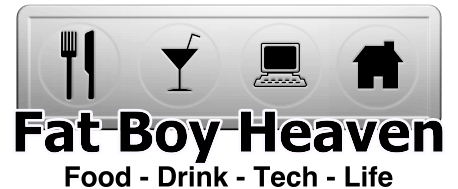One of the great things about a global economy and internet commerce is the ability to find bargains from unknown companies sometimes. This is the case with this latest product I found on Amazon, a pair of bluetooth headphones from Beyution that look a lot like the famous brand recently bought by Apple, but selling for just $26.11 instead of hundreds. The question was how close does the sound quality come, and how well built are they?
Read moreComing Soon: HemingWrite, "The Kindle of typewriters"
Hemingwrite is a new digital consumer product for writing composition developed by Adam Leeb and Patrick Paul. It features a distraction free experience with a singular focus on the writing experience.
The product is one of 20 new hardware devices competing in the Engadget.com Insert Coin competition this week. The competition highlights electronic hardware inventions from around the world culminating with the top teams invited to the Engadget Tech Conference in New York. Eligible companies are early startups which not have received any angel- or venture- capital financing and have not yet shipped products to consumers.
“What the Kindle did for reading, we want to do for writing,” said cofounder Patrick Paul of Hamtramck, Michigan. “Adam and I are huge fans of the simplicity of a typewriter but using one is tiresome and outdated. We set out to deliver the same distraction-free writing experience of a typewriter with all of the added benefits of modern technology: backups to the cloud, e-paper display, Cherry MX keyboard switches -- and nothing else.”
“I think what we created with our prototype is the best possible writing experience,” added cofounder Adam Leeb. “We combined all of the best aspects of the typewriter, the moleskine, and the computer to create a modern classic.”
can't wait to get my hands on one of these! This would be perfect for sitting down away from everything and just writing. Very cool in a decidedly retro way.
Hemingwrite is headquartered in Detroit, Michigan. For more information, visit http://www.hemingwrite.com.
Teknoholics Project: Mobile File sharing with PirateBox/LibraryBox

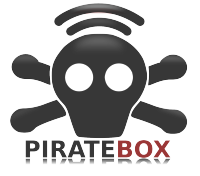
Last summer an interesting Kickstarter project launched, and was quickly funded at more than ten times it's requested ammount. The project was LibraryBox 2.0, a fork of the GNU GPLv3 licensed PirateBox art project by Dr. David Darts. The initial concept was to transform any space into a temporary communication and wireless file sharing network. When users join the PirateBox wireless network and open a web browser, they are automatically redirected to the PirateBox welcome page. Users can then immediately begin chatting and/or uploading or downloading files.
LibraryBox takes PirateBox to a little safer ground by sharing a library of files but no longer allowing people who connect to it the ability to upload potentially copywritten materials. The idea was the brain child of Jason Griffey an associate professor and head of Library Information Technology at the University of Tennessee at Chattanooga. His thought was that taking such a system into areas with limited or no internet access with a library of books, learning materials, disaster survival materials etc. could be of great assistance in disaster recovery areas, or foreign countries where access to the internet is severely regulated.
The project was featured in this months issue of MAKE: magazine, and since I already had the materials needed on hand I decided to play around with it to see how easy it was to get up and running.
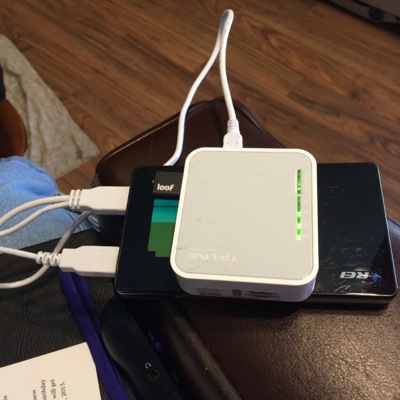
The foundation that the project is built on is a small wireless router from TP-Link, the MR3020. This small portable router is desgned to be used with 3G USB modems to share cellular data connections via wi-fi. The software of the router is overwritten with a program called OpenWRT, which for all intents and purposes turns the router into a web server.
The next thing that is needed is USB storage to house the files that are going to be shared. I used the Leef Fuse 2.0 32GB High-speed USB Flash Drive with Magnet Cap and PrimeGrade Memory (Charcoal/Black). I had other USB flash drives around, but this was the smallest with a decent capacity to be able to store data.
While that is all that is needed, to make my setup a little more portable and easier to deploy, I added a 12000mAh portable power bank that I had laying around.
So for you to build the exact setup I have put together would be less than $100. For that money you get a completely mobile filesharing device with 8-12 hours of uptime before it needs to be plugged in! Not a bad setup. You can use it to share files at a LAN Party, to share information at an outdoor event, or even as a kind of Digital GeoCache, where people can check-in on the wall to prove that they found it, and download a file or upload a file as well. The options are endless, and changes are relatively easy to make.
You can find the original project and instructions for the PirateBox here. Information on Jason Griffey's LibraryBox fork is available here, or in MAKE Volume 37, page 74.
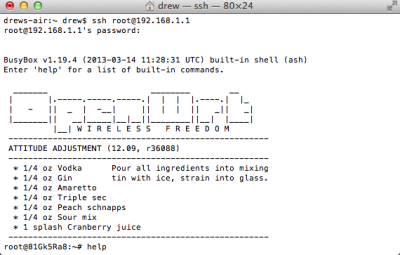 This is what you see in Terminal once you have connected to your MR3020 for the first time after it has been modified
This is what you see in Terminal once you have connected to your MR3020 for the first time after it has been modified
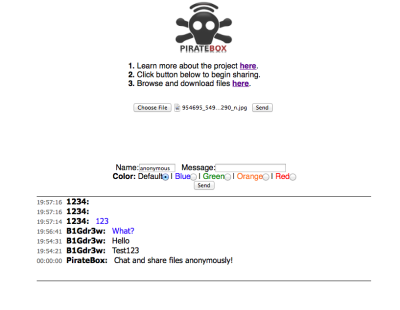 Uploading files and leaving notes on the chat board are easy tasks to accomplish
Uploading files and leaving notes on the chat board are easy tasks to accomplish
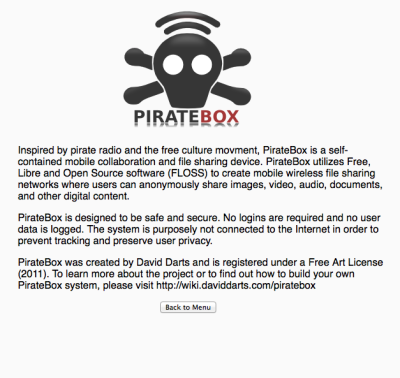 The main page information link takes you to this captive page with more details about the PirateBox concept
The main page information link takes you to this captive page with more details about the PirateBox concept
Fat Boy Heaven Italian Beef Sandwiches
Nothing beats a nice juicy Italian Beef Sandwich on a rainy night.
Wednesday nights are busy around our house, as they are in many homes. Carrie often works late, and the kids have youth group, so getting everyone together for dinner is hard. Sometimes that means eating out, but I prefer to cook something in the crockpot that is easy for everyone to eat.
Read moreReview: Triple C Designs "greenBoom" Portable speaker
 I recieved this months sampler from BirchBox, and was pleased to find that I recieved this small portable speaker form Triple C Designs. A small 2" cube that packs a decent wallop for such a small speaker. Carrie and the kids were amazed at the sound volume and quality as well. For $29 you aren't goinf to find a better marriage of form and function to pump your toons around the house or the yard this spring and summer. Check this thing out folks, you won't be sorry.
I recieved this months sampler from BirchBox, and was pleased to find that I recieved this small portable speaker form Triple C Designs. A small 2" cube that packs a decent wallop for such a small speaker. Carrie and the kids were amazed at the sound volume and quality as well. For $29 you aren't goinf to find a better marriage of form and function to pump your toons around the house or the yard this spring and summer. Check this thing out folks, you won't be sorry.
Triple C Designs Portable Speaker | April's Box | Birchbox:
Triple C Designs Portable Speaker
Dinner Tonight: Super Fast Corned Beef Pasties
Pasties are a traditional cornish hand pie made popular in the mining and timber towns of early America. Most often containing beef or pork along with root vegetables like rutabaga, potatoes, and carrots pasties were something that could easily be prepared and carried to work for a filing lunch on the job site. In the U.S. they are most commonly found in Minnesota, Wisconsin, and other northern states.
Read moreReview: Cafejo "My French-Press"
 The first french-press to use K-cups, and the cheapest keurig brewer on the marketI had the opportunity to get ahold of the Cafejo My French-Press
The first french-press to use K-cups, and the cheapest keurig brewer on the marketI had the opportunity to get ahold of the Cafejo My French-Press, and I am impressed. Taking the flexibility and ease of use of both a Keurig Coffee maker and a traditional french-press and merging them into a handy and portable gadget, this is a great coffee maker for anyone short on space or money. There are several things that make this actually better than a Keurig, the most desireable of which is the ability to use any liquid (including spirits and milk) at any temperature. Since many traditional coffee makers brew too hot and scorch coffee, and while wide ranging, K-Cups for Keurig brewers have limited variety the My French-Press really is the best of both worlds. Pick this up using the link above from Amazon, you won't be sorry.
